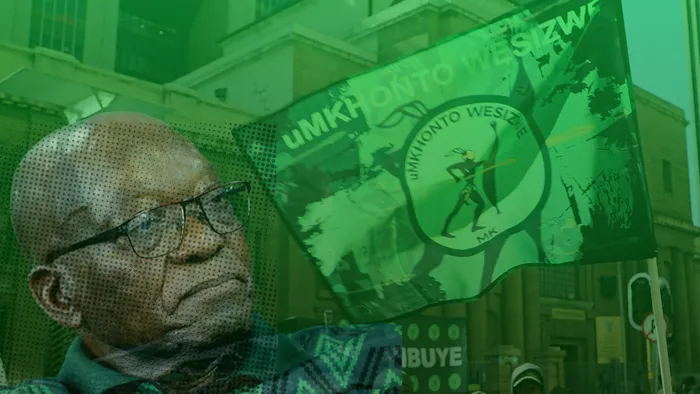A Leftist Vanguard: Can Jacob Zuma’s MK Party sustain its rapid rise?

Jacob Zuma’s uMkhonto weSizwe party has emerged as South Africa’s third-largest political force, sparking hope and controversy. As it grapples with internal dissent and Zuma’s dominant leadership, MK’s future remains uncertain.
Image: Lee Rondganger
Jacob Zuma, South Africa’s embattled former president, launched uMkhonto weSizwe (MK) iDecember 2023, a political party aiming to reignite the leftist struggle.
The announcement, made on the Day of Reconciliation, was steeped in historical symbolism.
Zuma declared MK as the next phase of the liberation struggle, shifting from the underground struggle to the voting booths of modern democracy.
Fast forward a year, and MK has disrupted the political landscape. While it still trails behind the ANC and Democratic Alliance (DA), it has rapidly established itself as the country’s third-largest party.
The question remains: Can MK sustain this momentum, or will it follow the fate of other short-lived political movements?
A Rapid Rise to Prominence
In its first election in May 2024, MKP shocked South Africa by securing more than four million votes, translating to 14% of the national tally.
This achievement came despite it launching five months before the election, its lack of traditional structures, clear policies, or well-developed branches.
However, MK’s ascent has not been without turbulence. Court battles, internal disputes, and financial struggles have exposed cracks in its foundation. Critics argue that while MK thrived on Zuma’s charisma, its long-term sustainability is far from guaranteed.
Zuma: The Party’s Central Figure
Zuma’s dominance within MK is both its strength and its Achilles’ heel. Court documents reveal that he wields near-absolute power within the party’s interim leadership.
He controls appointments, removals, and strategic decisions—a centralisation of authority he defends as necessary to prevent sabotage and infiltration.
Dissent, however, is growing.
Jabulani Khumalo, one of the party’s original founders, accused Zuma of sidelining grassroots activists who helped build MK.
These internal divisions have fuelled skepticism about MK’s ability to evolve into a democratic organisation.
Critics argue that Zuma’s leadership style undermines the principles of inclusivity and representation that MK claims to champion.
MK Funding
MK’s campaign was a spectacle, but its funding remains a mystery.
Analysts estimate the party’s election expenses exceeded R100 million, yet official disclosures report a single donation of R380,555.
This discrepancy has sparked speculation about how exactly is the party funded.
The MK Party maintains, however, that it is funded through donations by its members.
Stumbling in By-Elections
Despite its success at the national and provincial elections, its support has not carried over to subsequent by-elections.
In a recent by-election in Mtubatuba in KwaZulu-Natal, the party’s vote share fell 36% in May to just 13%.
A New Front for Leftist Politics
MK’s emergence signals a shift in South Africa’s leftist political landscape.
Where the Economic Freedom Fighters (EFF) once held the mantle of revolutionary politics, MK has stepped in to fill that space.
Its rhetoric, rooted in the language of the anti-apartheid resistance struggle, has resonated with South Africans who feel left behind 30 years into democratic ANC rule.
By positioning itself as a continuation of the liberation struggle, MK has reignited the spirit of protest politics in South Africa.
The Road Ahead
Despite its meteoric rise, MK faces formidable challenges.
Internal divisions, how it is financed and questions over its leadership structure threaten to undermine its progress.
As the party gears up for the 2026 local government elections, its ability to consolidate its early success will determine whether it can establish itself as a lasting political force.
For now, MK stands at a crossroads, embodying both the hope of those who have been cast aside by the ANC, and those yet to taste the fruits of democracy.
South Africans will be watching closely to see if this new front for leftist politics can deliver on its promises— or be consumed at the altar of greed and factionalism.
* Lee Rondganger is the Deputy Editor of IOL.
IOL Opinion
Related Topics: